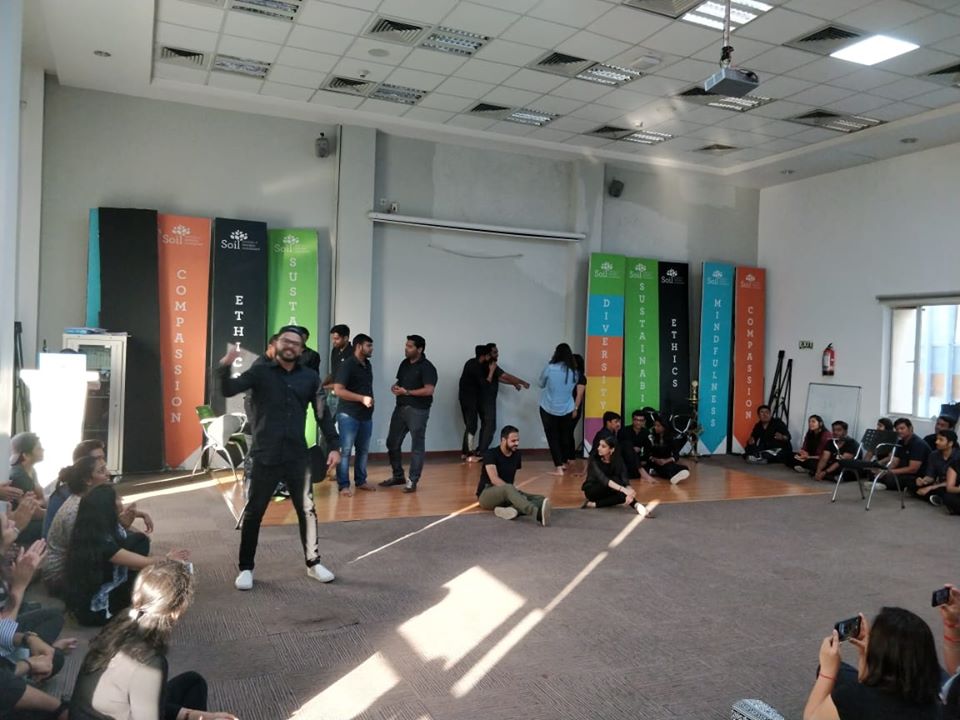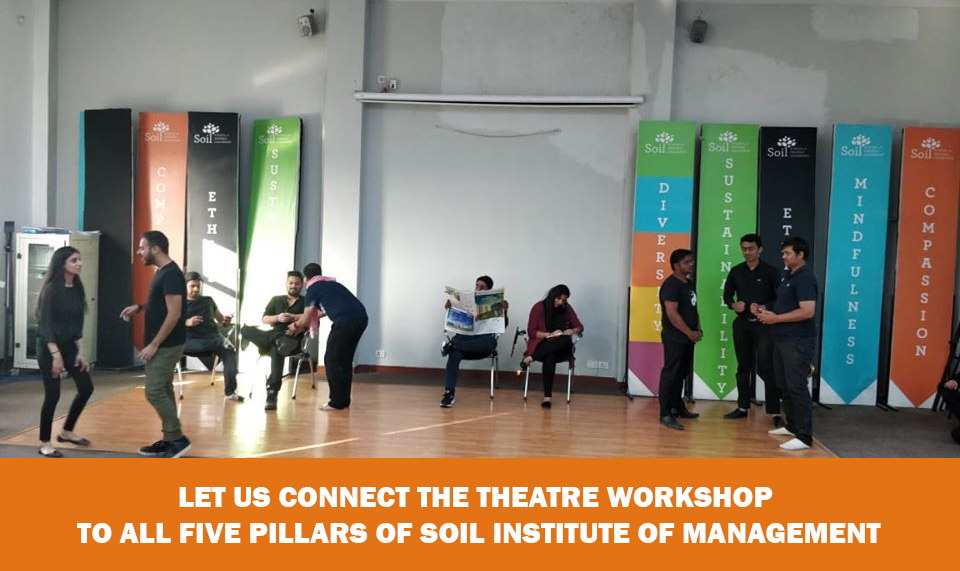Why Do We Continue to Create Theatre

Learnings and Importance of Theatre
18 Nov 2014
Theatre has been an influential factor in many people's lives allowing their creativity to flourish, and most importantly, enabling the development of their self-expression. This can have a profound impact on academics as well. Theatre is important because when students participate, they benefit significantly in terms of exploring the unexplored or finding the hidden ability to express. In addition, by shedding the inhibitions associated with performing in front of an audience, they feel more prepared to face any challenges in their careers or entrepreneurship journeys.

Theatre can be influential in all aspects of life. Participating in theatre classes can stimulate students' creativity and thought process. The very experience of theatre makes people more aware and sensitive towards several issues. Theatre classes, if effectively designed, have the potential to build confidence in the students & help them to snap out of their shells, and showcase their creativity freely.
Theatre classes are designed with an idea of pushing people out of their comfort zones and showcase their innovative skills. In a very subtle way, it works on your soft skills, making you ready and helps you connect with people by communicating effectively.
A SOIL management student who has experienced a theatre workshop said –
I personally benefited a lot from this course in a very short span of time. It's a different story altogether that I already had a flair for acting right from my childhood days. I got the opportunity to showcase my acting skills on a number of occasions. This was a platform extended to me after a very long time and not only helped me to learn the nuances of acting from a seasoned instructor, but also implement them in practice to experience the difference. The most striking aspect of the course was the realization that with determination and self-belief anything can be achieved. In one of the acts, students were asked to enact a paralyzed character who could push a glass of water only by means of his face. This exercise infused a sense of belief that it doesn't really matter how scarce the resources at your disposal are, you can always achieve whatever you want if you are determined and focused about it. Sincerity and determination were some of the key takeaways from this exercise – nicely substantiated!
Performing on stage doesn't necessarily mean that you need to be vocal to be able to communicate. Conveying messages to the audience without the use of dialogue is an art, worth learning during the course of the SOIL week-long annual workshop. The idea is to look at the making of a manager who is both a visionary and an "executionary".

It's a common notion that verbal articulation should be of highest order of importance when you are in the middle of any important setting. On the contrary, the fact is that using body language should be effective enough to substantiate your verbal communication. Numerous aspects of the theatrical experience are sensory and tactile. Workshops like these involve development of muscle flexibility, strength, control, and ability to use the entire body to communicate in a role. Theatre also helps those students who are not particularly looking to perform better, but desire to enhance their kinesthetic abilities. Transition to a higher perception is one of the key skills in a manager and these workshops go a long way in developing these skills.
It is a known fact that theatre develops and enhances social skills. It has been observed that people participating in theatre have the ability to respect, express, and negotiate the difference in opinions with utmost calm and composure. They manage to learn from each other, which is supplemental to the SOIL Way of classroom learning – interesting correlation!
Since most performances are in teams, it leads to fostering teamwork – one of the key skills of a manager. How to synchronize with, and complement the others in the play, timing the dialogue delivery to achieve the desired effect on the audience, are some of the key highlights of the SOIL workshop. The takeaway is immense, to learn to respect each other and work in a team.
Theatre makes all participants share their ideas and showcase their creativity in various ways. The most unexpected people quite often, surprise everyone else with their presence of mind. The theatre workshop helps in personality development in so many different ways, dissolving fears and inhibitions that people usually unconsciously hold onto. It helps in personality enhancement by making the participants more confident, expressive and comfortable in their own skin. The program preparation helps understand, and value the perspective of the others participating with them. As students endeavor to learn acting, be involved in the many aspects of theatre, and to entertain their audience, they are gaining an in-depth understanding of themselves as well as the others. In order to be a high performing team, a unique blend of activities at the workshop is important to first 'Self-Leadership'.
Considering today's market complexities, business leadership is one of the most sought after skills. Although theatre and business leadership may seem to, and do in fact leverage techniques that diverge sharply, there are numerous similarities that can not be overlooked.
- Both the business leader as well as the theatre leader are responsible for leading a cadre of people towards a goal, under a budget and a given deadline!
- The theatre leader and the business leader are responsible for communicating the team's vision and mission, effectively, in order to achieve the desired performance. This exercise includes various elements like allocating resources and monitoring the performance of each participant / employee.
- Not only the business leader, it is a part of the theatre leader's job to analyze, comprehend, and strategize. Of course, here the theatre leader has a slight advantage since they receive the script, but bringing the script to life through the performance is a challenging task. Comprehension here plays a massive role as, if either the business leader or the theatre leader fails to comprehend the true meaning, the true essence behind the goal, the final play / the business goal will not be achieved.
- Team and teamwork is crucial. The business leader as well as the theatre leader, both will agree that their team and selection of the team is an extremely important step. In case of a play – who plays what role and in case of a business setup – how much experience they have, and what designation or place they are given, plays a significant role. Each performer should be matched to their role. Needless to say, they can all be trained to handle various other business aspects. Understanding the demands and nature of the work, the role of the leader is to study the team members and select the one that would be the best fit for the role, keeping their unique qualities and personality traits that come complementary with them, in mind.
Let us connect the theatre workshop to all five pillars of SOIL Institute of Management.
Mindfulness comes first. It is all about becoming aware of yourself, the surroundings, your co-performers, and the audience. Success requires you to be mindful of whatever is happening in the act, in the now.

A business team, just like a theatre performance is a beautiful blend of different people from diverse backgrounds joining hands, working on their differences, shedding their inhibitions and working together to improve the final performance. This clearly refers to the pillar of diversity.
Leveraging the limited resources at your disposal is another great skill you will garner from the theatre workshop. This refers to the sustainability pillar.
In a play, if the actor fails to understand his role and the character he is playing, he will never be able to do justice to that performance. Putting yourself in others shoes to empathize with them is a crucial aspect. Hence the pillar of compassion plays an indispensable role here.
And last but not the least, the pillar of ethics forms the essence of theatre in the real sense. If we are true to ourselves, then only can we be true to our values as well as to others. To be successful in life, adaptability and flexibility is of paramount importance. Theatre enables you to explore more, face new challenges, and have the ability to adapt with the changing situations.
SOIL Institute of Management is one of the top management schools in India, offering the best one year MBA programs in Business Leadership, Digital & Analytics, and Human Resources. SOIL endeavours to educate, inform, and inspire leaders of tomorrow to face complex challenges, and drive business growth through experiential learning modules like Theatre workshops, industry mentorship, Live business projects, social innovation work and more.
Source: https://www.soil.edu.in/learnings-and-importance-of-theatre/
0 Response to "Why Do We Continue to Create Theatre"
Post a Comment